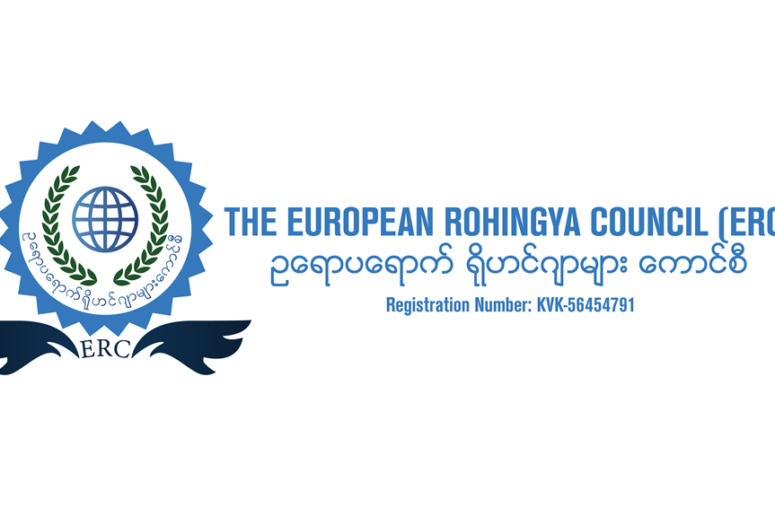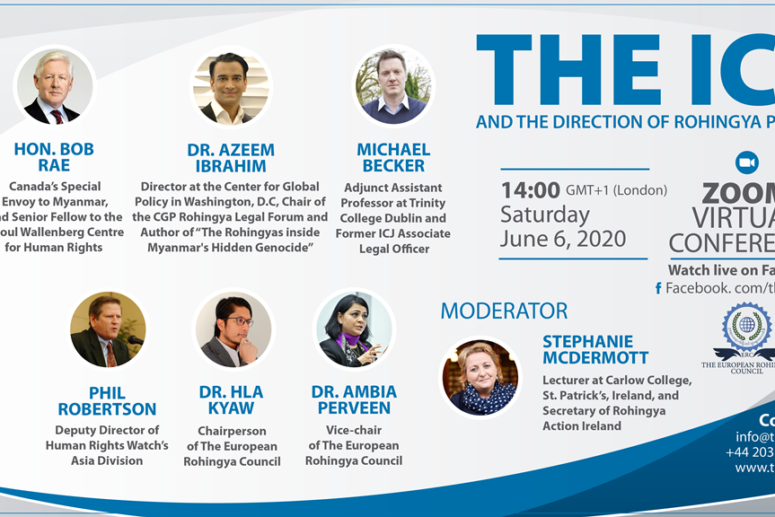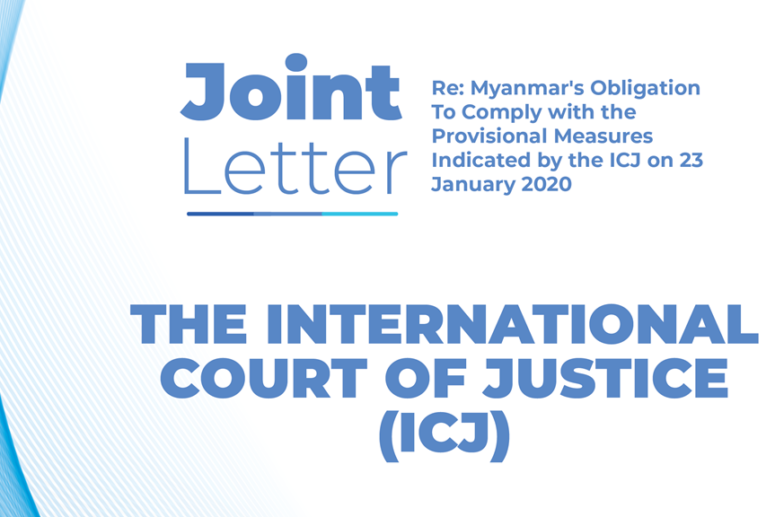PRESS RELEASE
June 7, 2020
THE ICJ AND THE DIRECTION OF ROHINGYA PLIGHT
The European Rohingya Council (ERC) organized the first live virtual conference on “The ICJ and The Direction of Rohingya’s Plight” on June 6, 2020. The aim of the conference was to revisit the ICJ ruling of January 2020 and to ascertain how to reignite and revive the cause of Rohingya at global level; to understand the ICJ’s reason to keep the Myanmar’s report “confidential”; to get perspectives from the experts on how to improve the current conditions of Rohingya in Myanmar and inside the refugee camps in Bangladesh; and how to mobilize global coalition of actors, including civil society organisations that are working for the human rights of Rohingya to be realized.
In the conference, renowned scholars, experts and activists who have unparalleled knowledge and expertise on the issues of Rohingya, shed light on a wide varieties of Rohingya issues.
The conference calls upon:
• Rohingya civil society organisations to write directly to the International Court of Justice (ICJ) to request that Myanmar’s periodic reports on compliance with the Court’s provisional measures order be made public, considering the importance of providing Rohingya communities and other observers the opportunity to ensure that Myanmar is taking concrete actions to comply in good faith.
• The Gambia to co-ordinate closely with Rohingya civil society organizations to ensure that Rohingya voices and the pressing concerns of the Rohingya people, both within and beyond Myanmar’s borders, are communicated to the ICJ in the course of the proceedings against Myanmar.
• All parties to recognize that the ICJ case and other legal actions in domestic and international courts are part of a broader political process aimed at achieving lasting reforms in Myanmar and justice for the Rohingya, and that legal solutions depend on political will and support from a wide range of actors, including governments and civil society, to succeed.
• The Gambia to steadfastly continue upholding the historic gesture of solidarity in filing the case against Myanmar for accountability and justice for the Rohingya community.
• The international community to provide supports to The Gambia in the pursuit of justice for the Rohingya community.
• The major international actors such as UK, UK, Canada, Australia, France, Germany, Sweden, the Netherlands, Australia, New Zealand, and among others to uphold the Genocide Convention and provide support to The Gambia.
• The international community to support Bangladesh and create sustainable conditions for Rohingya refugees in terms of healthcare, education, women empowerment, youth development.
• The government of Bangladesh to stop the relocation of Rohingya refugees to Bhashan Char.
• Myanmar to permanently close down the Internally Displaced Persons (IDPs) camps and resettled the displaced Rohingya to their places of origins with protections.
• Myanmar to provide the remaining Rohingya population access to education, healthcare, freedom of movement, freedom of religion, freedom of self-identification, freedom of participation in election and electing members, nationality, and among others.
• Myanmar to lift the internet shutdown and provide necessary healthcare to the Rohingya population during the Covid-19 pandemic without discrimination and prejudice. • Bangladesh to end the internet blackout in the camp.
• Myanmar and Bangladesh to do more to allow international humanitarian assistance to serve both the refugee and local populations
• Myanmar to address and take proper legal actions against racism, hate speech, anti-Rohingya sentiments and propaganda.
• Individuals, politicians, human rights organisations, Non-governmental organisations, civil society organisations and the international community to hold Myanmar accountable for the genocidal acts against the Rohingya community.
The participants of the conference:
1. Stephanie McDermott
Lecturer at Carlow College, St. Patrick’s and Secretary of Rohingya Action Ireland
2. Hon Bob Rae
Special Envoy of Canadian Prime Minister on Humanitarian and Refugee Issues
3. Dr. Azeem Ibrahim
Research Professor at the Strategic Studies Institute, U.S. Army War College, a Director at the Center for Global Policy in Washington, D.C, and Author of “The Rohingyas: Inside Myanmar’s Hidden Genocide”
4. Mr. Michael Becker
Adjunct Assistant Professor at Trinity College, Dublin, PhD candidate at University of Cambridge and Former ICJ Associate Legal Officer
5. Mr. Phil Robertson
Deputy Director of Human Rights Watch’s Asia Division
6. Dr. Hla Kyaw
Chairman of The European Rohingya Council and Rohingya medical doctor and health scientist
7. Dr. Ambia Perveen
Vice-chair of The European Rohingya Council, and Paediatrician and Child Psychiatrist
More information:
Dr. Hla Kyaw
Chairman | The European Rohingya Council
chairman@theerc.eu
